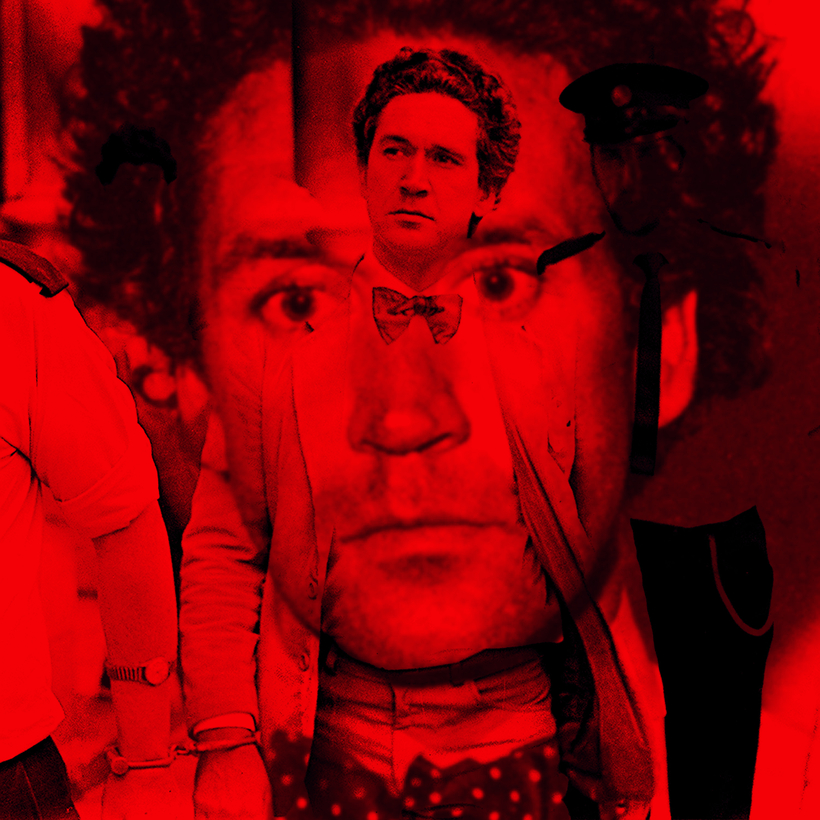Dublin, 1982. Malcolm Macarthur, 37, landed gentry, suave, erudite, impeccably well connected, has been living off a large inheritance since his 20s, but money doesn’t hang around long with those who don’t cling on. At the risk of going bust, Macarthur sets out to try to solve his problem. He decides to rob a bank.
His plan is absurdly ill-conceived, and every part goes horribly, brutally wrong. Two young people are left dead, their killer on the run. When found by police, Macarthur is at the home of his friend Patrick Connolly, in the same apartment complex where a three-year-old Mark O’Connell’s grandparents live. The flame of a writer’s fascination with a brutal killer is lit; the product, O’Connell’s new book A Thread of Violence.
Connolly was the attorney general, the most senior legal figure in Ireland at the time. Macarthur’s guilty plea meant no full trial, no evidence brought before the court for examination, no questions for his friends to answer. Amid the tabloid frenzy, the sense of facts being hidden fostered conspiracy, boosted the notoriety of the crimes. Macarthur was sentenced to life in prison, and released after 30 years.
Malcolm Macarthur, landed gentry, suave, erudite, impeccably well connected, has been living off a large inheritance since his 20s, but money doesn’t hang around long with those who don’t cling on.
Each victim receives just a short chapter in the story of their killer. This is deliberate, O’Connell explains—it would be a liberty to tell their stories in a book about Macarthur, but they’re the ones who suffered to make Macarthur’s story so interesting. They may be spoken of little, but they are forever the ghosts in the room.
Bridie Gargan, a 27-year-old nurse, battered to death with a hammer as Macarthur tried to steal her car. Donal Dunne, a 27-year-old farmer, shot in the face as Macarthur sought to steal a shotgun Dunne was selling. Needless, brutal violence. The car and the gun could have been taken without harming either person; the opportunities were obvious.
So, why? What makes a person do things the rest of us never would, never could? How does an unthinkable last resort become a preferred option? Macarthur needed money fast, and this was a fast way to get money. O’Connell calls it “the psychological paradox of the whole affair: ruthless logic in service of a deeper madness.”
That very human need to understand growls in the background of every page, drives O’Connell, fuels, alongside crass voyeurism, the true-crime boom. There’s an instinct to search for reasons. Not excuses, necessarily, but something we can all point to by way of explanation, reassuring ourselves that we’ve identified the cause of the horror.
O’Connell digs into Macarthur’s childhood, the isolated only child of wealthy parents in a violent marriage. Macarthur, lost deep in his own self-image as a well-raised person, dismisses it. The idea is too neat, too simple, and every line O’Connell seeks to draw from Macarthur back to a formative moment frays, breaks before it can be tied.
So prevalent are murderers in modern media, books, movies, TV, that every possible stereotype has become ingrained. The damaged soul, the malevolent force, the madness within. If a perpetrator fails to wear any of those outfits, how do we view them? In Macarthur’s case he veers between cold-blooded intellectual and comical buffoon, with no settled middle point, no single identity.
So, why? What makes a person do things the rest of us never would, never could?
There’s also the killer as performer. That sense comes across in Macarthur’s telling of his own story, the reluctance to expand on the damning details, drawing the performance out. A man whose life seems to have been full of façade, using the double murder he committed to construct a stage upon which he can alleviate his loneliness by talking to O’Connell at length.
There’s a pattern in his defense, both against accusations from others and self-awareness. Every clear truth is dragged into the shadows, muffled by the killer’s certainty in his own lies, confusing every part of the picture. This places a greater pressure on the writer to sacrifice narrative for truth, a step that is, thankfully, willingly taken.
This is also a book about privilege, the people it forms, and as such it becomes about the writer as much as the subject. In assessing his own life, O’Connell finds the similarities with the killer that make the differences all the harder to explain. Shared experiences do not create equal minds.
Macarthur, as a subject, is undoubtedly fascinating, the wealthy socialite turned murderer, the entertaining eternal student with a remarkable lack of common sense. His “episode,” as he calls it, is tinged with enough farce to draw the eye away from the hideous brutality of it, but never for long.
O’Connell interviews him extensively, creating as full a picture of the man as possible, skirting around the edges of the true-crime trap of humanizing the killer, of making him the likable protagonist. The image of Macarthur on the back seat of Gargan’s car, her hair gripped in one hand, hammer in the other, bars likability.
Macarther is, of course, an unreliable narrator of his own story. We are never less trustworthy than when we’re talking about ourselves. His self-perception, as an otherwise moral and upstanding individual who suffered a single aberration, adds to the sense that little, if any, of his statements are worth your trust.
A Thread of Violence is a tantalizing book, forever reaching out toward ungraspable truths, fingers brushing against them before they slip away again. O’Connell is wandering through the unmapped wilds of the human psyche, in search of the unfindable. Interesting, intelligent, very readable, but inevitably as frustrating as its central figure. There can be no neat wrapping up, no complete understanding, only the awkward sense of a conclusion without finality.

Malcolm Mackay is the author of eight crime novels with a focus on organized crime, including the award-winning Glasgow Trilogy

